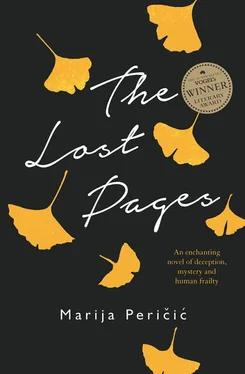I told myself that the reason I took this early journey on foot was because the tram frequently broke down in hot weather and I wanted to be sure to get to my office early, to have some time alone in which to start my day. This was partly true, but it was only the varnish with which I covered my shame at the real truth of my unsightly self. However, walking at this hour was one of the rare times in the day that I was able to escape the harrying thoughts and unanswerable questions that plagued me. Anja and Franz would fall away and my body was significant only as a collection of sensory organs. The air moulded itself around me, as I propelled myself forward, and closed off behind me in my wake, like warm water around a swimmer. This relaxed me, and I was lulled into a trance as I walked.
When I was a child and had first learned to swim it was as though the world had finally opened to me; for the first time I had found a place where I felt at home. I had been a self-conscious child from the moment I noticed my difference from other children and realised it was not something that could be overcome with the passage of time. My lumbering movements were mimicked by the other children in the schoolyard, and adults and older children would look at me with a kind of fear. My offensiveness to them pained me, so I withdrew into myself and tried to erect boundaries with which to contain my difference. I tried to police my own movements and began the long process of learning to control them as much as I was able.
My mother, for the first years [17] Two pages have been torn out of the notebook and have not been recovered. The first part of this sentence is an approximation.
after I was out of the harness, and after the death of my brother, Otto, guarded me as one would an invalid, which was how I thought of myself. I was not allowed to join the other children for games and sports at school, and, instead of allowing me to participate in the gymnastics lesson, the teacher ordered me home for the hour. Although this action on my mother’s part was motivated by a desire to protect me, it only served to emphasise my difference and exposed me even more to the cruel taunts and violence of the schoolyard. I hated returning home for that afternoon hour; every day it felt like coming home from a defeat. One spring, instead of going home, I began to spend the hour walking around the streets, or lingering in parks. I crossed and recrossed the Moldau on each of the bridges by turn.
I loved the river, and would find a quiet place on the bank where I would weave small boats from reeds and twigs and sail them in the shallows. Or I would just sit for a long time, silent and still, watching the birds and listening to their song, and that of the whirring insects and the wind hissing in the leaves. Sitting there, silently listening, I seemed to fade away into the undergrowth and lose awareness of myself. My body and my external life floated away from me and I became a part of the riverbank, another animal life among so many others, no more or less important.
As the weather grew warm, I would see the occasional swimmer making his way down the river. I would sit hidden in the long grass, transfixed. The swimmers were like other river animals, like larger otters; I didn’t relate to them as people. On warm days I would sit with my eyes on the water, looking out for them, and when one appeared I would creep quietly down to the water, as though I might scare them off if I made a sound. I would lean out over the water and watch them glide past, craning my neck to keep them in view for as long as possible. I drank up the sight of their sleek motion with a fierce envy that originated in my flesh and muscles rather than my mind. I would feel the beginnings of tears sting my eyes.
I wanted to rush out and join them, and indeed in my imagination I was already out there, swimming with them; water gurgling past me, cool against my face and with soft strings of bubbles rising from my lips like pearls. As the days passed I became determined to swim. I began to study the motions that the passing swimmers made with their arms and head, and practised them while lying face down on the grass. After a few days of this, I undressed and walked naked and shivering into the water, which was colder than seemed possible. I found a place with a partly submerged tree trunk that extended out into the river, and which I could hold on to as I ventured out into the deeper water.
At first, the touch of the water frightened me, but gradually I became accustomed to it. After a few days I was even quite comfortable with the sensation of the water lapping around my chin and lips, and even of being submerged, but I had great difficulty launching myself from my standing position into a horizontal one. This took many days of practice, and the unfamiliar orientation confused me at first, expelling the breath from my body like a reflex.
My difficulty was that, although I had learned from the passing swimmers to move my arms around and around like the wheels of a mill, I had no idea what to do with my legs. All I could see of the swimmers’ legs was a fizzing wake that seemed to propel them forward. My legs were the weakest part of me. At first, when I tried to kick off from the riverbed they would drift behind me like a heavy train, floating for a short while but then slowly sinking down to the sandy bottom again. I experimented with different movements; I tried rotating my legs as though on a bicycle, in time with my arms, or rotating my feet in tiny circles. It was extremely difficult for me to control my right leg, which was only a soft, spongy thing, lacking any muscle. Eventually I hit upon the notion of kicking my legs up and down, and I practised this motion first holding on to the tree trunk, which had become like a friend to me, its knots and footholds familiar and reassuring. Over the weeks of that summer I slowly learned to propel myself along.
Soon I could even swim few strokes underwater, my belly gliding close above the riverbed. I came up laughing; it was like flying, and for the first time in my life I did not feel restricted in space. I floated and rolled around in the river’s grip, and my limbs, glowing white through the dark water, no longer seemed to be objects of pity.
Hearing the clock in the Old Town square strike was the signal for me to return to school, and the sound of it was more awful to me than any early-morning alarm bell. The realities of my life came rushing back to me. Reluctantly, slowly, I would swim ashore; school, my mother, every hardship I endured seemed to be waiting for me on that riverbank. I would dress hastily and hurry back to school, late, my hair still wet, my toes inside my socks ringed with river mud.
So many years later, in my early-morning walking to the post office, I was able to regain the same sense of freedom that being in the river that long-ago summer had given me, and for at least a short while I could lose myself in the world. On those walks I was no longer anyone. I breathed the air, I felt it on my face and my hands, my feet moved along the cobblestones, and that was all. Only when the walls of the post office came into view did I come back into myself, and my life opened its wings again and enclosed me. The dull sound of the heavy double doors swinging closed behind me was like the sound of the clock chiming in my childhood, a grim herald of what it meant to be me.
After arriving at the office, I could usually count on having at least an hour to myself before the other workers began to arrive, and even then it was rare that anyone would bother me for another hour after that. If I was writing, I would allow myself fifteen minutes or so to read the newspaper or a review in a journal and drink a morning cup of coffee, before commencing work. At that time I had finished the travelogue, and Schopenhauer was done with, so I was casting feebly about for some new ideas.
Читать дальше












